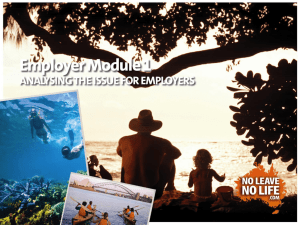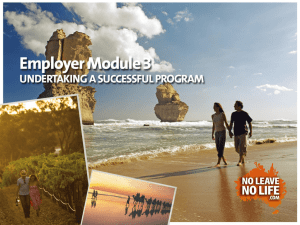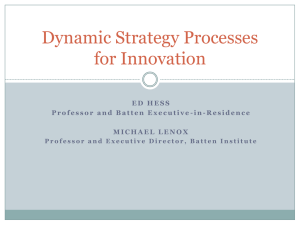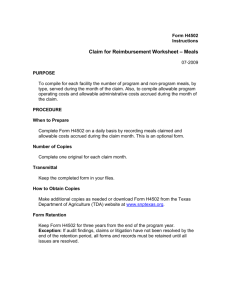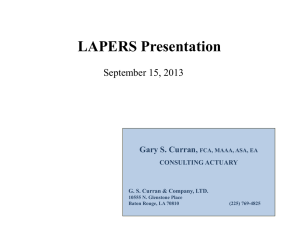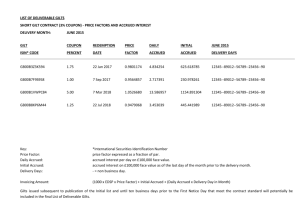Module2.ppt - Tourism Australia
advertisement
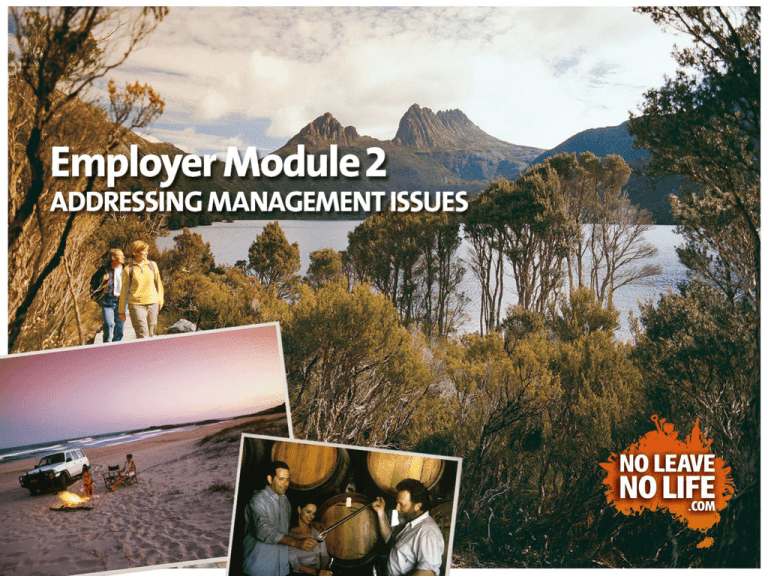
Module 2 Objectives At the end of the session, participants will have an understanding of: • • • • The issue and the impacts How to encourage employees to take leave Some of the difficulties managers face in dealing with the issue and how to address them How to encourage staff to take leave and examples of initiatives to reduce leave liability Our Organisation This slide should be tailored to specifically reflect your organisation's data Why is this program so important? • Our current annual leave liability is X days or X dollars • X% of our staff have <10 days of accrued leave • X% of our staff have 11-20 days of accrued leave • X% of our staff have 21-30 days of accrued leave • X% of our staff have 31+ days of accrued leave Impact - Employers • • • • • • • Financial liability Productivity OH&S issues Inhibits internal transfers Staff retention Adverse organisational reputation Potential increase in sick leave Impact - Employees • • • • • Adverse impact on health and well-being affecting productivity ‘Burn-out’ Job satisfaction Absenteeism Commitment and morale Management Challenges • • • • • • Annual leave is not always seen as critical as other management priorities Lack of reporting Increased business expectations Team pressures Meeting targets Competing priorities Other Points to Note • • Positive impact of leave taking on staff development and succession planning To increase retention of talent it is important to recognise high performers need a break Despite the Difficulties… • • This issue cannot be resolved by the HR department alone Leadership from senior management is pivotal to successfully addressing the issue. Easier said than done… so, how do we do this? Staff Approaches • • • Forcing employees to use excessive leave can cause resentment. A compromise solution is likely to be the most effective Collaborative agreements allow employees to plan use of annual leave in a time frame acceptable to the organisation Ways to Encourage Leave • • • • • • • • Provide adequate cover Incentives and rewards Clear management support Holiday deals and information Email volume management Incorporate in staff KPI’s Greater visibility of management taking leave Regular meetings with employees to plan leave Ways to Encourage Leave • • • Plan for it – factor into business planning process Review leave liabilities by staff member monthly Cultural change: – Vision – Lead by example – Team goals – Be supportive – Review annual leave policies – Communication tools – Be creative Encouraging Leave • • • Plan for it – factor into business planning process Review leave liabilities by staff member monthly Cultural change: – Vision – Lead by example – Team goals – Be supportive Encouraging Leave • • • • Coaching of staff Permanent agenda item during departmental meetings Provide cover and support for staff on leave Cross training Encouraging Leave • • • • • Regularly inform employees of the leave accrual Ensure a fast and easy approval process Annual leave policy amendment Encourage staff to use noleavenolife.com for holiday deals and travel ideas Be cautious; consider individual circumstances Encouraging Leave • • Encourage a combination of holidays and short bursts of leave If taken frequently encourages employees to spend leave ‘enjoying’ rather than ‘recovering’ Encouraging Leave • • • • • Staff KPI – reward performance accordingly Line manager KPI for their team Offer incentives and rewards to teams that reduce leave accruals Provide rewards for staff who leave their mobile and laptop at work Target existing reward and recognition programs to encourage leave taking Discussion Topic - Case Study 1 • Fred has been employed by XYZ company for 8 years. He is in a senior position and has accrued 9 weeks of annual leave. You have suggested to Fred that he may like to utilise some of his leave however he feels he has too much work on and is too busy to take any leave at this time • What are some of the things you can do as a manager to address Fred’s concerns? Discussion Topic - Case Study 2 • Your CEO has asked that you, as General Manager, reduce the leave liability within your business unit. Your team comprises of: – You, with 36 days – Judy (your highest performer) with 40 days – Frank, with 16 days – Ian, with 8 days • As a manager, how would you address this situation? Discussion Topic - Case Study 3 • Nancy (Generation Y) has accrued 4 weeks leave. Nancy has worked on challenging projects all year and as it is approaching holiday season (where business operation is at its quietest) you have suggested it may be an opportune time for her to take some leave before the next project commences. Nancy’s response has been that she is planning to travel around Australia in 6 months time so wants to stockpile her leave until then • What are some of the things you can do as a manager to address this situation? In Summary • • • • • • • • • Recognise the benefits of regular leave taking Managers - lead by example Thorough planning ensures adequate coverage If you commit to rolling out this program, then you need to do it! Integrate leave planning into current processes – talk about it. Encourage staff to take ownership Coach staff to address barriers Short breaks are a great solution especially where relevant workplace or personal barriers exist Consider incentives/rewards to encourage leave taking
